Contemporary Hospitality Industry Analysis: Marriott International
VerifiedAdded on 2022/11/25
|13
|3349
|230
Report
AI Summary
This report provides a comprehensive analysis of the contemporary hospitality industry, using Marriott International as a case study. It begins with an introduction to the industry, defining its scope and key sectors such as food and beverage, travel and tourism, lodging, and recreation. The report then delves into Marriott International's operations, including its operational and functional departments, and examines its contributions to local, national, and international economies. A significant portion of the report is dedicated to analyzing the interrelationships between operational and functional departments, as well as the impact of franchising and licensing agreements on global development. The report also explores various operational roles within the industry, the skills required for these roles, and the current skills shortages. It concludes by discussing the impact of these skills gaps on hospitality businesses and proposing solutions for addressing them. The report utilizes PESTLE and SWOT analyses to provide a holistic view of Marriott International's position within the industry.
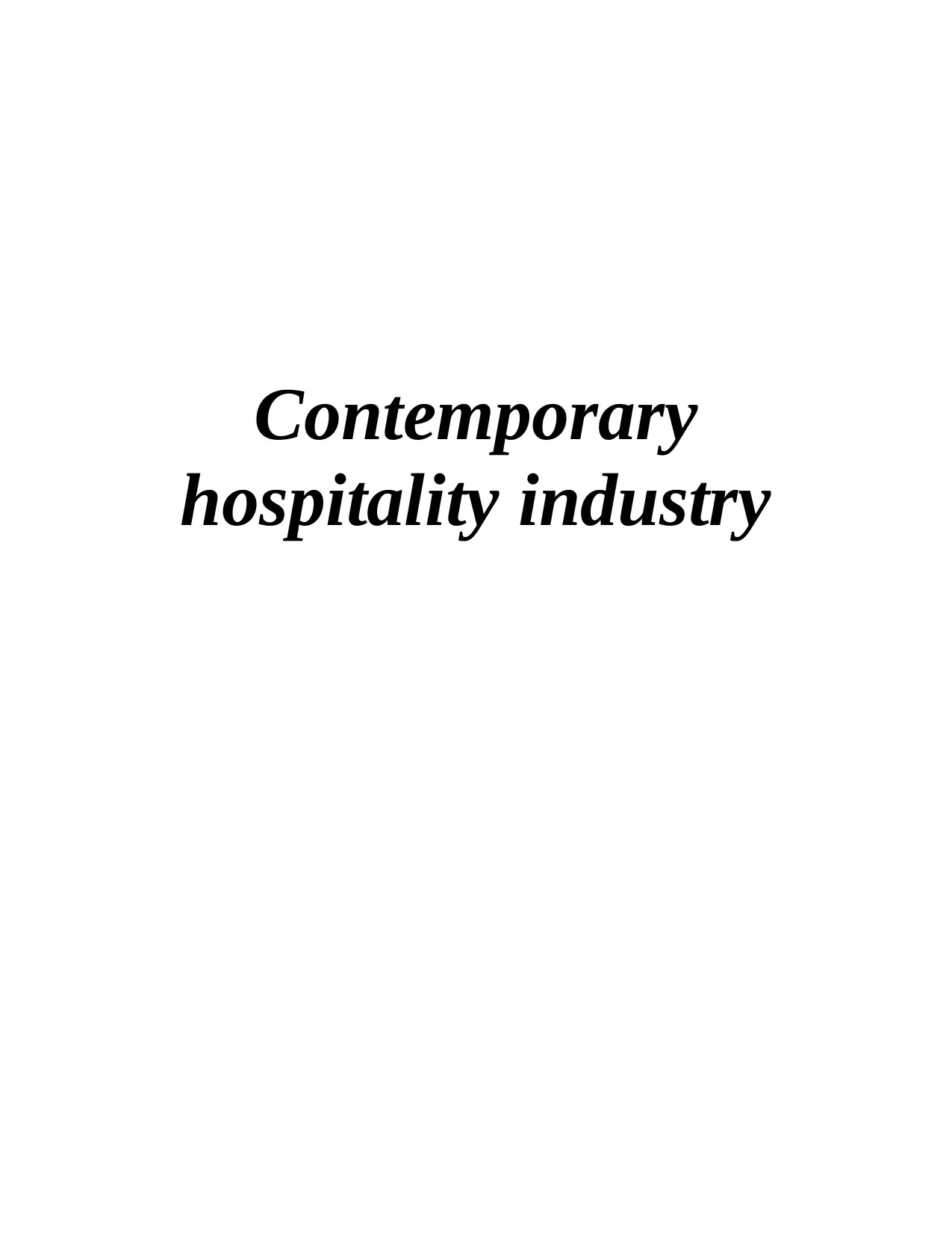
Contemporary
hospitality industry
hospitality industry
Paraphrase This Document
Need a fresh take? Get an instant paraphrase of this document with our AI Paraphraser
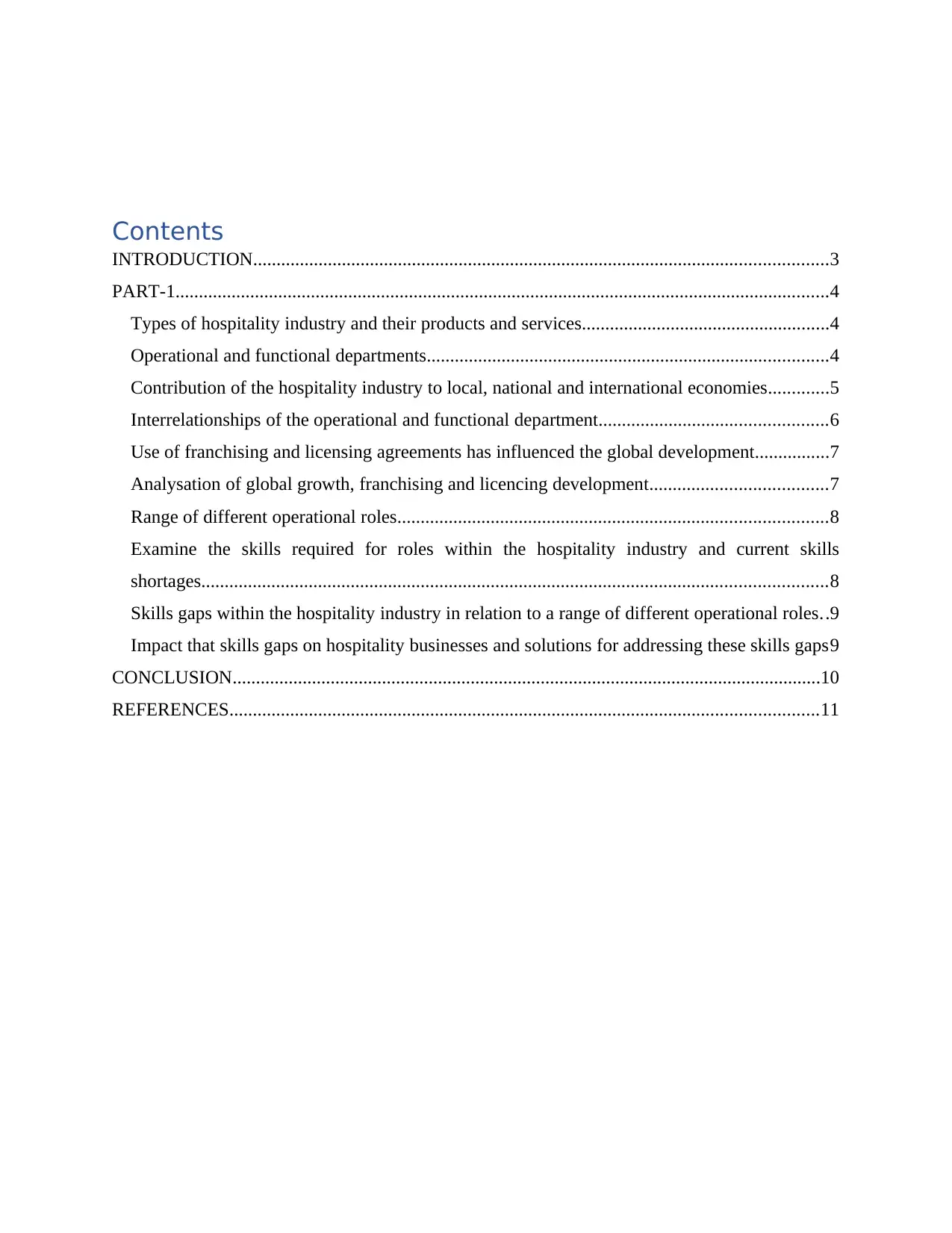
Contents
INTRODUCTION...........................................................................................................................3
PART-1............................................................................................................................................4
Types of hospitality industry and their products and services.....................................................4
Operational and functional departments......................................................................................4
Contribution of the hospitality industry to local, national and international economies.............5
Interrelationships of the operational and functional department.................................................6
Use of franchising and licensing agreements has influenced the global development................7
Analysation of global growth, franchising and licencing development......................................7
Range of different operational roles............................................................................................8
Examine the skills required for roles within the hospitality industry and current skills
shortages......................................................................................................................................8
Skills gaps within the hospitality industry in relation to a range of different operational roles..9
Impact that skills gaps on hospitality businesses and solutions for addressing these skills gaps9
CONCLUSION..............................................................................................................................10
REFERENCES..............................................................................................................................11
INTRODUCTION...........................................................................................................................3
PART-1............................................................................................................................................4
Types of hospitality industry and their products and services.....................................................4
Operational and functional departments......................................................................................4
Contribution of the hospitality industry to local, national and international economies.............5
Interrelationships of the operational and functional department.................................................6
Use of franchising and licensing agreements has influenced the global development................7
Analysation of global growth, franchising and licencing development......................................7
Range of different operational roles............................................................................................8
Examine the skills required for roles within the hospitality industry and current skills
shortages......................................................................................................................................8
Skills gaps within the hospitality industry in relation to a range of different operational roles..9
Impact that skills gaps on hospitality businesses and solutions for addressing these skills gaps9
CONCLUSION..............................................................................................................................10
REFERENCES..............................................................................................................................11
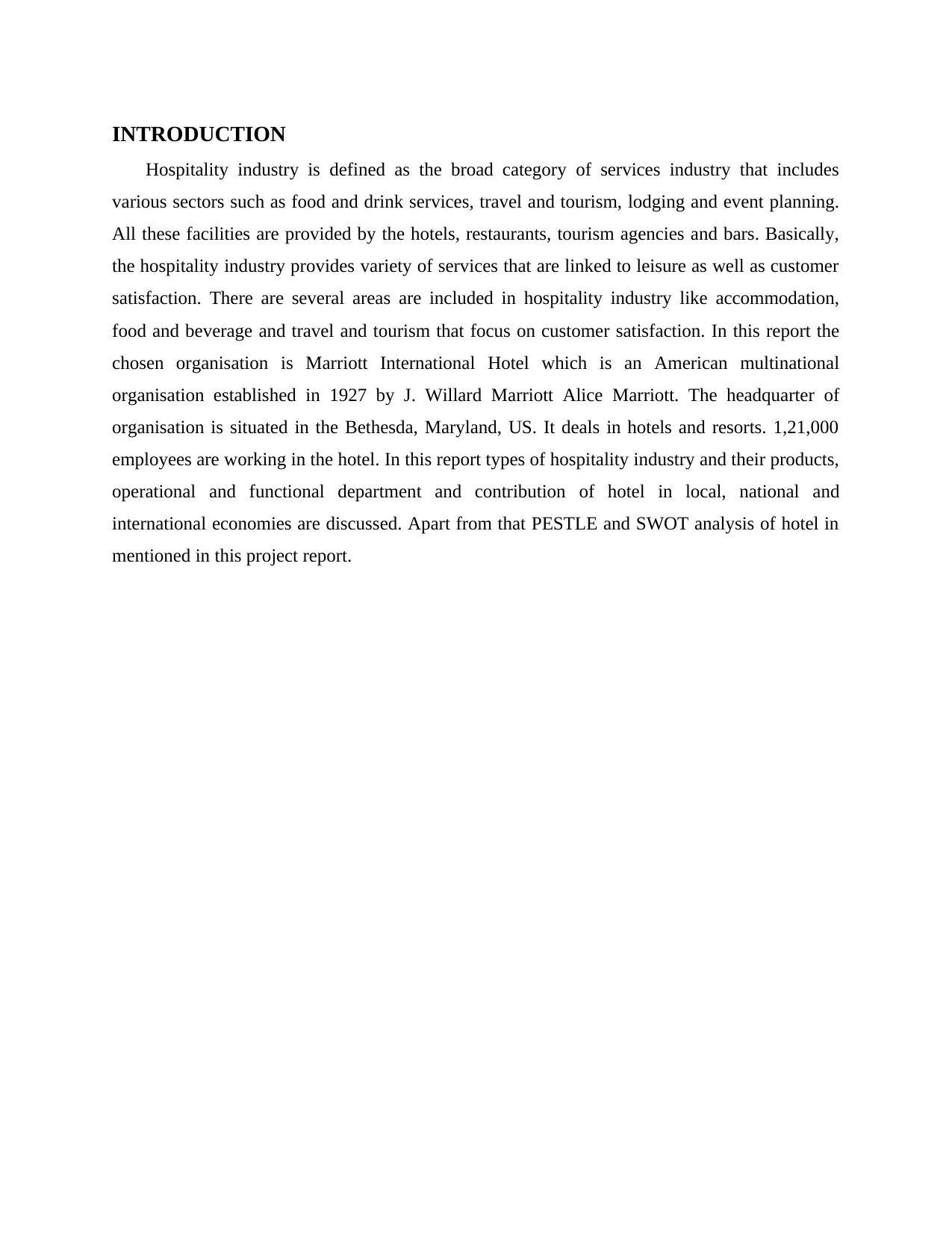
INTRODUCTION
Hospitality industry is defined as the broad category of services industry that includes
various sectors such as food and drink services, travel and tourism, lodging and event planning.
All these facilities are provided by the hotels, restaurants, tourism agencies and bars. Basically,
the hospitality industry provides variety of services that are linked to leisure as well as customer
satisfaction. There are several areas are included in hospitality industry like accommodation,
food and beverage and travel and tourism that focus on customer satisfaction. In this report the
chosen organisation is Marriott International Hotel which is an American multinational
organisation established in 1927 by J. Willard Marriott Alice Marriott. The headquarter of
organisation is situated in the Bethesda, Maryland, US. It deals in hotels and resorts. 1,21,000
employees are working in the hotel. In this report types of hospitality industry and their products,
operational and functional department and contribution of hotel in local, national and
international economies are discussed. Apart from that PESTLE and SWOT analysis of hotel in
mentioned in this project report.
Hospitality industry is defined as the broad category of services industry that includes
various sectors such as food and drink services, travel and tourism, lodging and event planning.
All these facilities are provided by the hotels, restaurants, tourism agencies and bars. Basically,
the hospitality industry provides variety of services that are linked to leisure as well as customer
satisfaction. There are several areas are included in hospitality industry like accommodation,
food and beverage and travel and tourism that focus on customer satisfaction. In this report the
chosen organisation is Marriott International Hotel which is an American multinational
organisation established in 1927 by J. Willard Marriott Alice Marriott. The headquarter of
organisation is situated in the Bethesda, Maryland, US. It deals in hotels and resorts. 1,21,000
employees are working in the hotel. In this report types of hospitality industry and their products,
operational and functional department and contribution of hotel in local, national and
international economies are discussed. Apart from that PESTLE and SWOT analysis of hotel in
mentioned in this project report.
⊘ This is a preview!⊘
Do you want full access?
Subscribe today to unlock all pages.

Trusted by 1+ million students worldwide
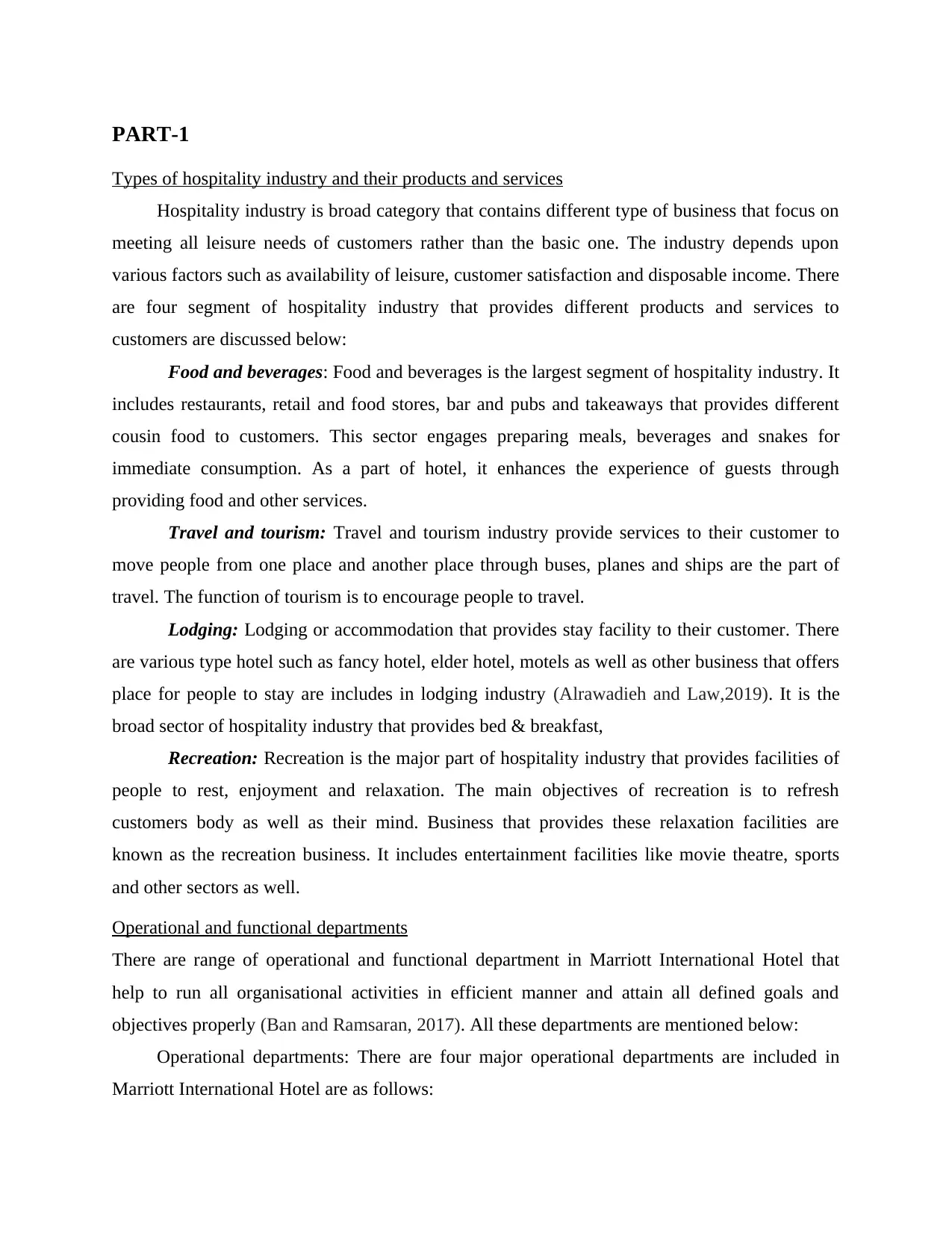
PART-1
Types of hospitality industry and their products and services
Hospitality industry is broad category that contains different type of business that focus on
meeting all leisure needs of customers rather than the basic one. The industry depends upon
various factors such as availability of leisure, customer satisfaction and disposable income. There
are four segment of hospitality industry that provides different products and services to
customers are discussed below:
Food and beverages: Food and beverages is the largest segment of hospitality industry. It
includes restaurants, retail and food stores, bar and pubs and takeaways that provides different
cousin food to customers. This sector engages preparing meals, beverages and snakes for
immediate consumption. As a part of hotel, it enhances the experience of guests through
providing food and other services.
Travel and tourism: Travel and tourism industry provide services to their customer to
move people from one place and another place through buses, planes and ships are the part of
travel. The function of tourism is to encourage people to travel.
Lodging: Lodging or accommodation that provides stay facility to their customer. There
are various type hotel such as fancy hotel, elder hotel, motels as well as other business that offers
place for people to stay are includes in lodging industry (Alrawadieh and Law,2019). It is the
broad sector of hospitality industry that provides bed & breakfast,
Recreation: Recreation is the major part of hospitality industry that provides facilities of
people to rest, enjoyment and relaxation. The main objectives of recreation is to refresh
customers body as well as their mind. Business that provides these relaxation facilities are
known as the recreation business. It includes entertainment facilities like movie theatre, sports
and other sectors as well.
Operational and functional departments
There are range of operational and functional department in Marriott International Hotel that
help to run all organisational activities in efficient manner and attain all defined goals and
objectives properly (Ban and Ramsaran, 2017). All these departments are mentioned below:
Operational departments: There are four major operational departments are included in
Marriott International Hotel are as follows:
Types of hospitality industry and their products and services
Hospitality industry is broad category that contains different type of business that focus on
meeting all leisure needs of customers rather than the basic one. The industry depends upon
various factors such as availability of leisure, customer satisfaction and disposable income. There
are four segment of hospitality industry that provides different products and services to
customers are discussed below:
Food and beverages: Food and beverages is the largest segment of hospitality industry. It
includes restaurants, retail and food stores, bar and pubs and takeaways that provides different
cousin food to customers. This sector engages preparing meals, beverages and snakes for
immediate consumption. As a part of hotel, it enhances the experience of guests through
providing food and other services.
Travel and tourism: Travel and tourism industry provide services to their customer to
move people from one place and another place through buses, planes and ships are the part of
travel. The function of tourism is to encourage people to travel.
Lodging: Lodging or accommodation that provides stay facility to their customer. There
are various type hotel such as fancy hotel, elder hotel, motels as well as other business that offers
place for people to stay are includes in lodging industry (Alrawadieh and Law,2019). It is the
broad sector of hospitality industry that provides bed & breakfast,
Recreation: Recreation is the major part of hospitality industry that provides facilities of
people to rest, enjoyment and relaxation. The main objectives of recreation is to refresh
customers body as well as their mind. Business that provides these relaxation facilities are
known as the recreation business. It includes entertainment facilities like movie theatre, sports
and other sectors as well.
Operational and functional departments
There are range of operational and functional department in Marriott International Hotel that
help to run all organisational activities in efficient manner and attain all defined goals and
objectives properly (Ban and Ramsaran, 2017). All these departments are mentioned below:
Operational departments: There are four major operational departments are included in
Marriott International Hotel are as follows:
Paraphrase This Document
Need a fresh take? Get an instant paraphrase of this document with our AI Paraphraser
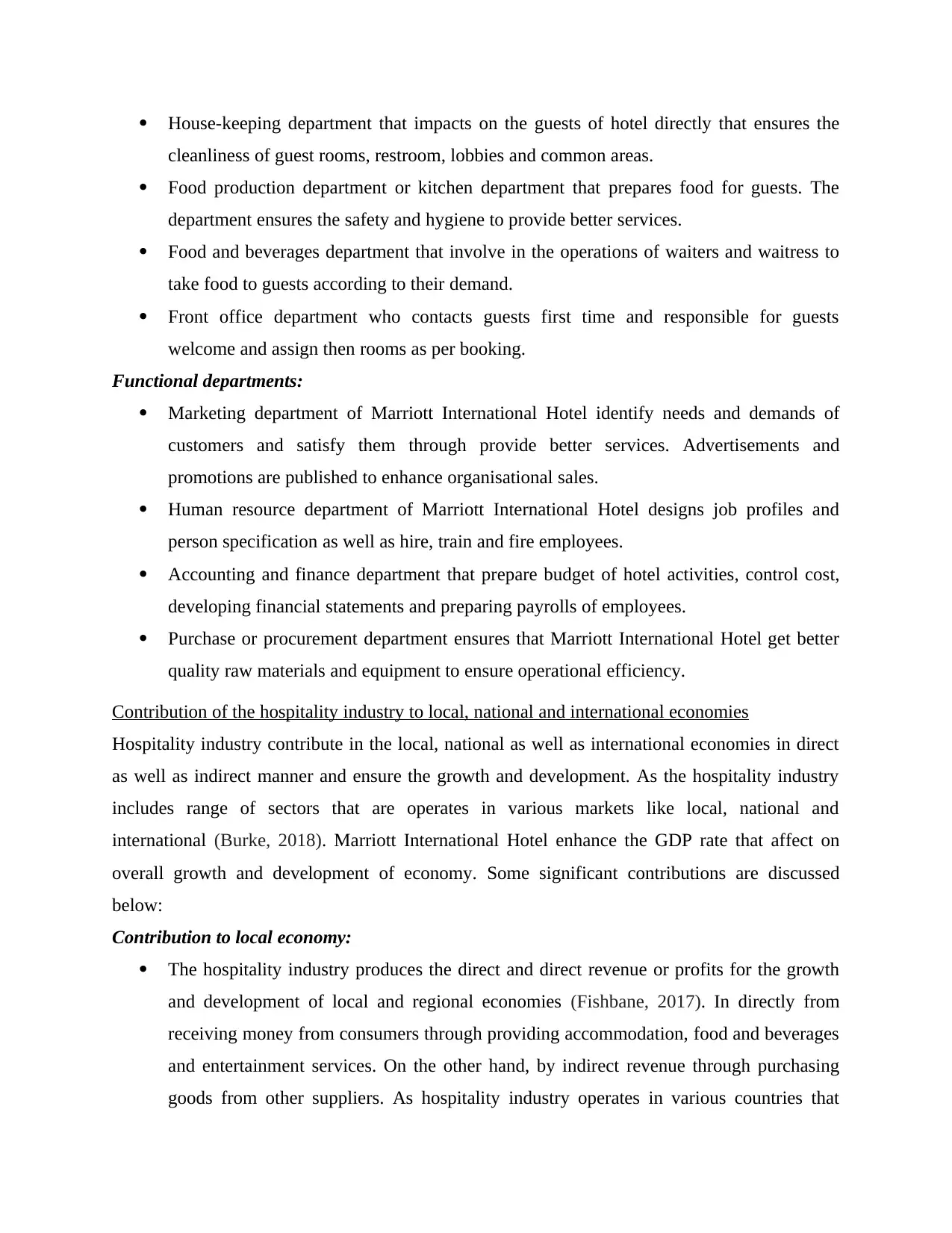
House-keeping department that impacts on the guests of hotel directly that ensures the
cleanliness of guest rooms, restroom, lobbies and common areas.
Food production department or kitchen department that prepares food for guests. The
department ensures the safety and hygiene to provide better services.
Food and beverages department that involve in the operations of waiters and waitress to
take food to guests according to their demand.
Front office department who contacts guests first time and responsible for guests
welcome and assign then rooms as per booking.
Functional departments:
Marketing department of Marriott International Hotel identify needs and demands of
customers and satisfy them through provide better services. Advertisements and
promotions are published to enhance organisational sales.
Human resource department of Marriott International Hotel designs job profiles and
person specification as well as hire, train and fire employees.
Accounting and finance department that prepare budget of hotel activities, control cost,
developing financial statements and preparing payrolls of employees.
Purchase or procurement department ensures that Marriott International Hotel get better
quality raw materials and equipment to ensure operational efficiency.
Contribution of the hospitality industry to local, national and international economies
Hospitality industry contribute in the local, national as well as international economies in direct
as well as indirect manner and ensure the growth and development. As the hospitality industry
includes range of sectors that are operates in various markets like local, national and
international (Burke, 2018). Marriott International Hotel enhance the GDP rate that affect on
overall growth and development of economy. Some significant contributions are discussed
below:
Contribution to local economy:
The hospitality industry produces the direct and direct revenue or profits for the growth
and development of local and regional economies (Fishbane, 2017). In directly from
receiving money from consumers through providing accommodation, food and beverages
and entertainment services. On the other hand, by indirect revenue through purchasing
goods from other suppliers. As hospitality industry operates in various countries that
cleanliness of guest rooms, restroom, lobbies and common areas.
Food production department or kitchen department that prepares food for guests. The
department ensures the safety and hygiene to provide better services.
Food and beverages department that involve in the operations of waiters and waitress to
take food to guests according to their demand.
Front office department who contacts guests first time and responsible for guests
welcome and assign then rooms as per booking.
Functional departments:
Marketing department of Marriott International Hotel identify needs and demands of
customers and satisfy them through provide better services. Advertisements and
promotions are published to enhance organisational sales.
Human resource department of Marriott International Hotel designs job profiles and
person specification as well as hire, train and fire employees.
Accounting and finance department that prepare budget of hotel activities, control cost,
developing financial statements and preparing payrolls of employees.
Purchase or procurement department ensures that Marriott International Hotel get better
quality raw materials and equipment to ensure operational efficiency.
Contribution of the hospitality industry to local, national and international economies
Hospitality industry contribute in the local, national as well as international economies in direct
as well as indirect manner and ensure the growth and development. As the hospitality industry
includes range of sectors that are operates in various markets like local, national and
international (Burke, 2018). Marriott International Hotel enhance the GDP rate that affect on
overall growth and development of economy. Some significant contributions are discussed
below:
Contribution to local economy:
The hospitality industry produces the direct and direct revenue or profits for the growth
and development of local and regional economies (Fishbane, 2017). In directly from
receiving money from consumers through providing accommodation, food and beverages
and entertainment services. On the other hand, by indirect revenue through purchasing
goods from other suppliers. As hospitality industry operates in various countries that
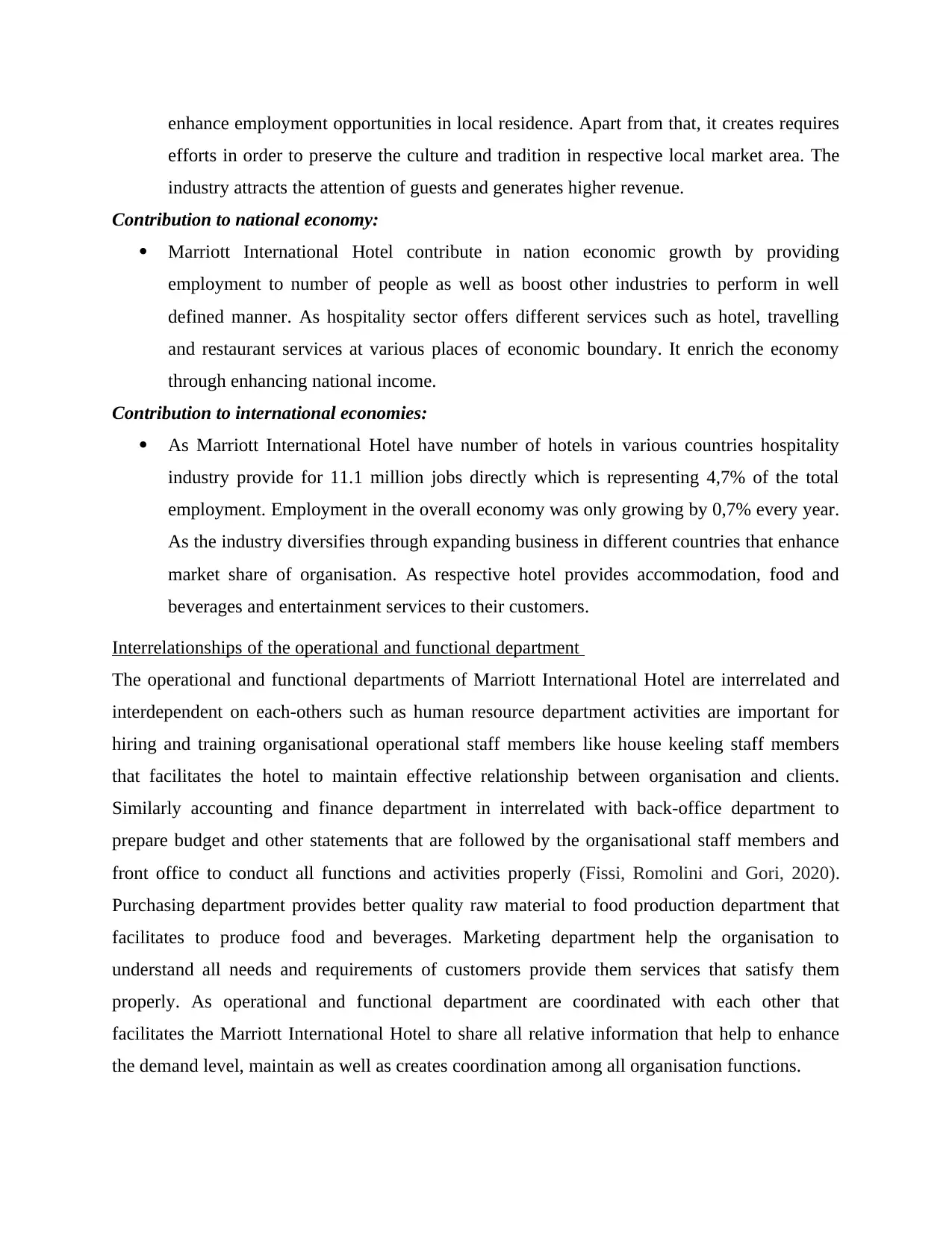
enhance employment opportunities in local residence. Apart from that, it creates requires
efforts in order to preserve the culture and tradition in respective local market area. The
industry attracts the attention of guests and generates higher revenue.
Contribution to national economy:
Marriott International Hotel contribute in nation economic growth by providing
employment to number of people as well as boost other industries to perform in well
defined manner. As hospitality sector offers different services such as hotel, travelling
and restaurant services at various places of economic boundary. It enrich the economy
through enhancing national income.
Contribution to international economies:
As Marriott International Hotel have number of hotels in various countries hospitality
industry provide for 11.1 million jobs directly which is representing 4,7% of the total
employment. Employment in the overall economy was only growing by 0,7% every year.
As the industry diversifies through expanding business in different countries that enhance
market share of organisation. As respective hotel provides accommodation, food and
beverages and entertainment services to their customers.
Interrelationships of the operational and functional department
The operational and functional departments of Marriott International Hotel are interrelated and
interdependent on each-others such as human resource department activities are important for
hiring and training organisational operational staff members like house keeling staff members
that facilitates the hotel to maintain effective relationship between organisation and clients.
Similarly accounting and finance department in interrelated with back-office department to
prepare budget and other statements that are followed by the organisational staff members and
front office to conduct all functions and activities properly (Fissi, Romolini and Gori, 2020).
Purchasing department provides better quality raw material to food production department that
facilitates to produce food and beverages. Marketing department help the organisation to
understand all needs and requirements of customers provide them services that satisfy them
properly. As operational and functional department are coordinated with each other that
facilitates the Marriott International Hotel to share all relative information that help to enhance
the demand level, maintain as well as creates coordination among all organisation functions.
efforts in order to preserve the culture and tradition in respective local market area. The
industry attracts the attention of guests and generates higher revenue.
Contribution to national economy:
Marriott International Hotel contribute in nation economic growth by providing
employment to number of people as well as boost other industries to perform in well
defined manner. As hospitality sector offers different services such as hotel, travelling
and restaurant services at various places of economic boundary. It enrich the economy
through enhancing national income.
Contribution to international economies:
As Marriott International Hotel have number of hotels in various countries hospitality
industry provide for 11.1 million jobs directly which is representing 4,7% of the total
employment. Employment in the overall economy was only growing by 0,7% every year.
As the industry diversifies through expanding business in different countries that enhance
market share of organisation. As respective hotel provides accommodation, food and
beverages and entertainment services to their customers.
Interrelationships of the operational and functional department
The operational and functional departments of Marriott International Hotel are interrelated and
interdependent on each-others such as human resource department activities are important for
hiring and training organisational operational staff members like house keeling staff members
that facilitates the hotel to maintain effective relationship between organisation and clients.
Similarly accounting and finance department in interrelated with back-office department to
prepare budget and other statements that are followed by the organisational staff members and
front office to conduct all functions and activities properly (Fissi, Romolini and Gori, 2020).
Purchasing department provides better quality raw material to food production department that
facilitates to produce food and beverages. Marketing department help the organisation to
understand all needs and requirements of customers provide them services that satisfy them
properly. As operational and functional department are coordinated with each other that
facilitates the Marriott International Hotel to share all relative information that help to enhance
the demand level, maintain as well as creates coordination among all organisation functions.
⊘ This is a preview!⊘
Do you want full access?
Subscribe today to unlock all pages.

Trusted by 1+ million students worldwide
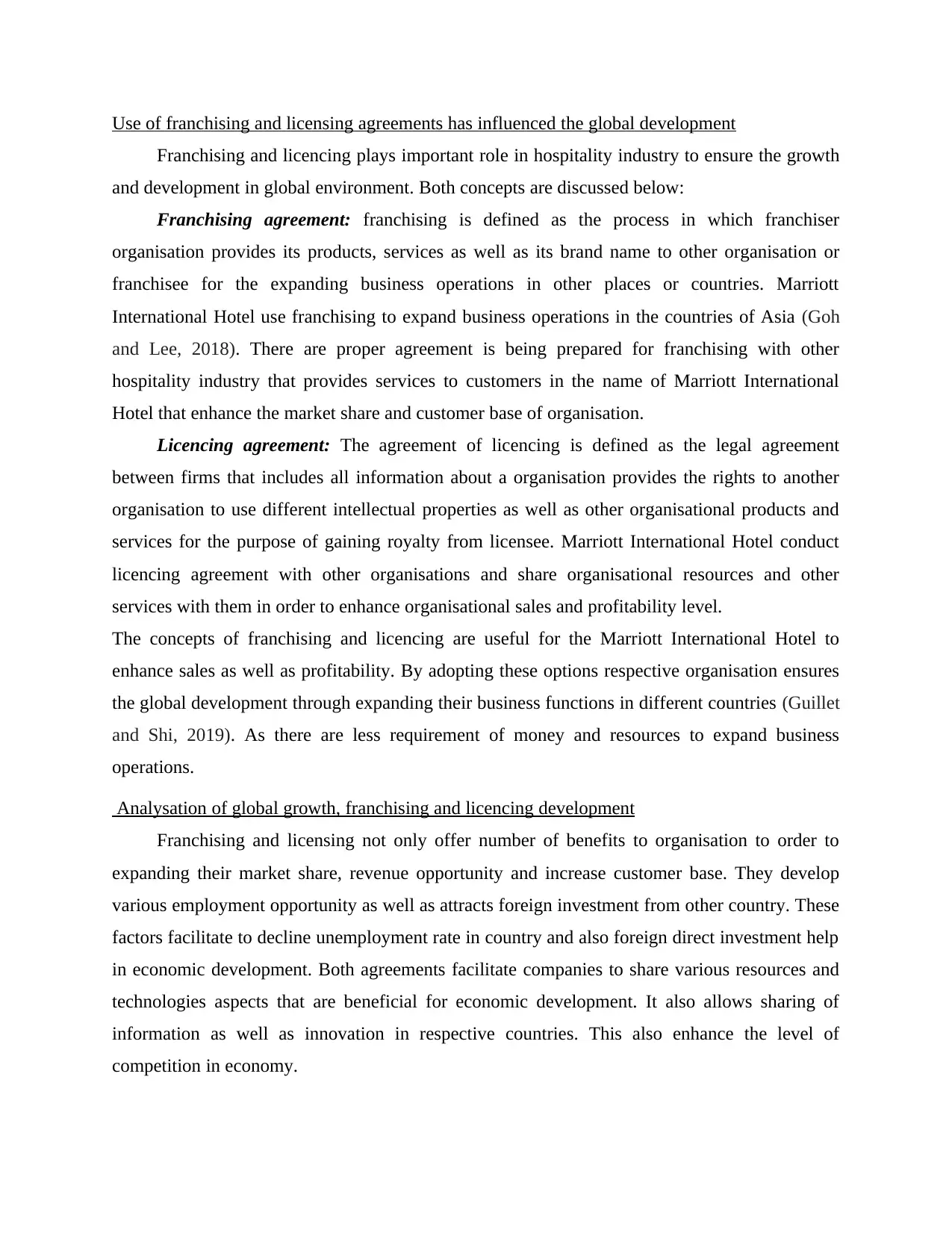
Use of franchising and licensing agreements has influenced the global development
Franchising and licencing plays important role in hospitality industry to ensure the growth
and development in global environment. Both concepts are discussed below:
Franchising agreement: franchising is defined as the process in which franchiser
organisation provides its products, services as well as its brand name to other organisation or
franchisee for the expanding business operations in other places or countries. Marriott
International Hotel use franchising to expand business operations in the countries of Asia (Goh
and Lee, 2018). There are proper agreement is being prepared for franchising with other
hospitality industry that provides services to customers in the name of Marriott International
Hotel that enhance the market share and customer base of organisation.
Licencing agreement: The agreement of licencing is defined as the legal agreement
between firms that includes all information about a organisation provides the rights to another
organisation to use different intellectual properties as well as other organisational products and
services for the purpose of gaining royalty from licensee. Marriott International Hotel conduct
licencing agreement with other organisations and share organisational resources and other
services with them in order to enhance organisational sales and profitability level.
The concepts of franchising and licencing are useful for the Marriott International Hotel to
enhance sales as well as profitability. By adopting these options respective organisation ensures
the global development through expanding their business functions in different countries (Guillet
and Shi, 2019). As there are less requirement of money and resources to expand business
operations.
Analysation of global growth, franchising and licencing development
Franchising and licensing not only offer number of benefits to organisation to order to
expanding their market share, revenue opportunity and increase customer base. They develop
various employment opportunity as well as attracts foreign investment from other country. These
factors facilitate to decline unemployment rate in country and also foreign direct investment help
in economic development. Both agreements facilitate companies to share various resources and
technologies aspects that are beneficial for economic development. It also allows sharing of
information as well as innovation in respective countries. This also enhance the level of
competition in economy.
Franchising and licencing plays important role in hospitality industry to ensure the growth
and development in global environment. Both concepts are discussed below:
Franchising agreement: franchising is defined as the process in which franchiser
organisation provides its products, services as well as its brand name to other organisation or
franchisee for the expanding business operations in other places or countries. Marriott
International Hotel use franchising to expand business operations in the countries of Asia (Goh
and Lee, 2018). There are proper agreement is being prepared for franchising with other
hospitality industry that provides services to customers in the name of Marriott International
Hotel that enhance the market share and customer base of organisation.
Licencing agreement: The agreement of licencing is defined as the legal agreement
between firms that includes all information about a organisation provides the rights to another
organisation to use different intellectual properties as well as other organisational products and
services for the purpose of gaining royalty from licensee. Marriott International Hotel conduct
licencing agreement with other organisations and share organisational resources and other
services with them in order to enhance organisational sales and profitability level.
The concepts of franchising and licencing are useful for the Marriott International Hotel to
enhance sales as well as profitability. By adopting these options respective organisation ensures
the global development through expanding their business functions in different countries (Guillet
and Shi, 2019). As there are less requirement of money and resources to expand business
operations.
Analysation of global growth, franchising and licencing development
Franchising and licensing not only offer number of benefits to organisation to order to
expanding their market share, revenue opportunity and increase customer base. They develop
various employment opportunity as well as attracts foreign investment from other country. These
factors facilitate to decline unemployment rate in country and also foreign direct investment help
in economic development. Both agreements facilitate companies to share various resources and
technologies aspects that are beneficial for economic development. It also allows sharing of
information as well as innovation in respective countries. This also enhance the level of
competition in economy.
Paraphrase This Document
Need a fresh take? Get an instant paraphrase of this document with our AI Paraphraser
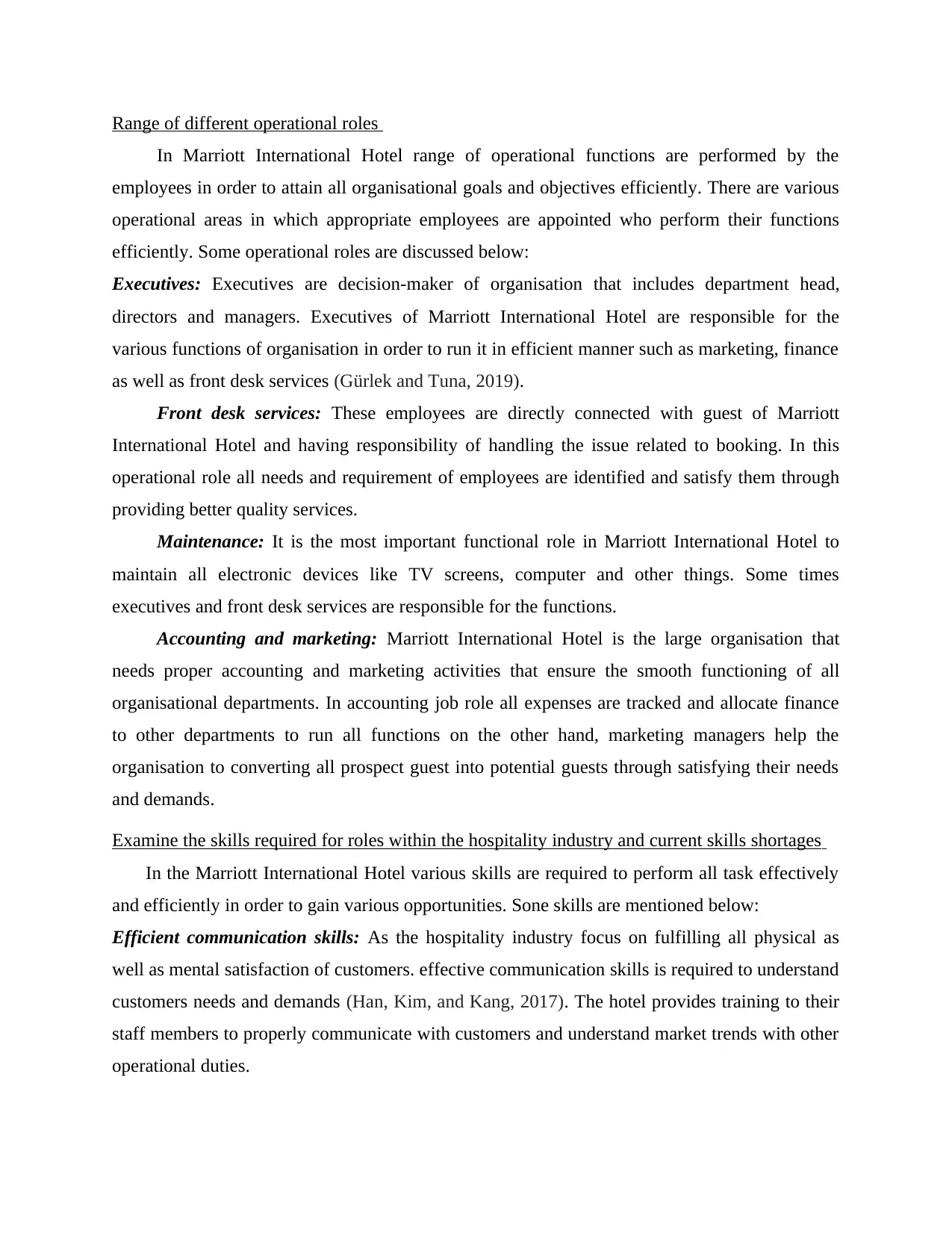
Range of different operational roles
In Marriott International Hotel range of operational functions are performed by the
employees in order to attain all organisational goals and objectives efficiently. There are various
operational areas in which appropriate employees are appointed who perform their functions
efficiently. Some operational roles are discussed below:
Executives: Executives are decision-maker of organisation that includes department head,
directors and managers. Executives of Marriott International Hotel are responsible for the
various functions of organisation in order to run it in efficient manner such as marketing, finance
as well as front desk services (Gürlek and Tuna, 2019).
Front desk services: These employees are directly connected with guest of Marriott
International Hotel and having responsibility of handling the issue related to booking. In this
operational role all needs and requirement of employees are identified and satisfy them through
providing better quality services.
Maintenance: It is the most important functional role in Marriott International Hotel to
maintain all electronic devices like TV screens, computer and other things. Some times
executives and front desk services are responsible for the functions.
Accounting and marketing: Marriott International Hotel is the large organisation that
needs proper accounting and marketing activities that ensure the smooth functioning of all
organisational departments. In accounting job role all expenses are tracked and allocate finance
to other departments to run all functions on the other hand, marketing managers help the
organisation to converting all prospect guest into potential guests through satisfying their needs
and demands.
Examine the skills required for roles within the hospitality industry and current skills shortages
In the Marriott International Hotel various skills are required to perform all task effectively
and efficiently in order to gain various opportunities. Sone skills are mentioned below:
Efficient communication skills: As the hospitality industry focus on fulfilling all physical as
well as mental satisfaction of customers. effective communication skills is required to understand
customers needs and demands (Han, Kim, and Kang, 2017). The hotel provides training to their
staff members to properly communicate with customers and understand market trends with other
operational duties.
In Marriott International Hotel range of operational functions are performed by the
employees in order to attain all organisational goals and objectives efficiently. There are various
operational areas in which appropriate employees are appointed who perform their functions
efficiently. Some operational roles are discussed below:
Executives: Executives are decision-maker of organisation that includes department head,
directors and managers. Executives of Marriott International Hotel are responsible for the
various functions of organisation in order to run it in efficient manner such as marketing, finance
as well as front desk services (Gürlek and Tuna, 2019).
Front desk services: These employees are directly connected with guest of Marriott
International Hotel and having responsibility of handling the issue related to booking. In this
operational role all needs and requirement of employees are identified and satisfy them through
providing better quality services.
Maintenance: It is the most important functional role in Marriott International Hotel to
maintain all electronic devices like TV screens, computer and other things. Some times
executives and front desk services are responsible for the functions.
Accounting and marketing: Marriott International Hotel is the large organisation that
needs proper accounting and marketing activities that ensure the smooth functioning of all
organisational departments. In accounting job role all expenses are tracked and allocate finance
to other departments to run all functions on the other hand, marketing managers help the
organisation to converting all prospect guest into potential guests through satisfying their needs
and demands.
Examine the skills required for roles within the hospitality industry and current skills shortages
In the Marriott International Hotel various skills are required to perform all task effectively
and efficiently in order to gain various opportunities. Sone skills are mentioned below:
Efficient communication skills: As the hospitality industry focus on fulfilling all physical as
well as mental satisfaction of customers. effective communication skills is required to understand
customers needs and demands (Han, Kim, and Kang, 2017). The hotel provides training to their
staff members to properly communicate with customers and understand market trends with other
operational duties.
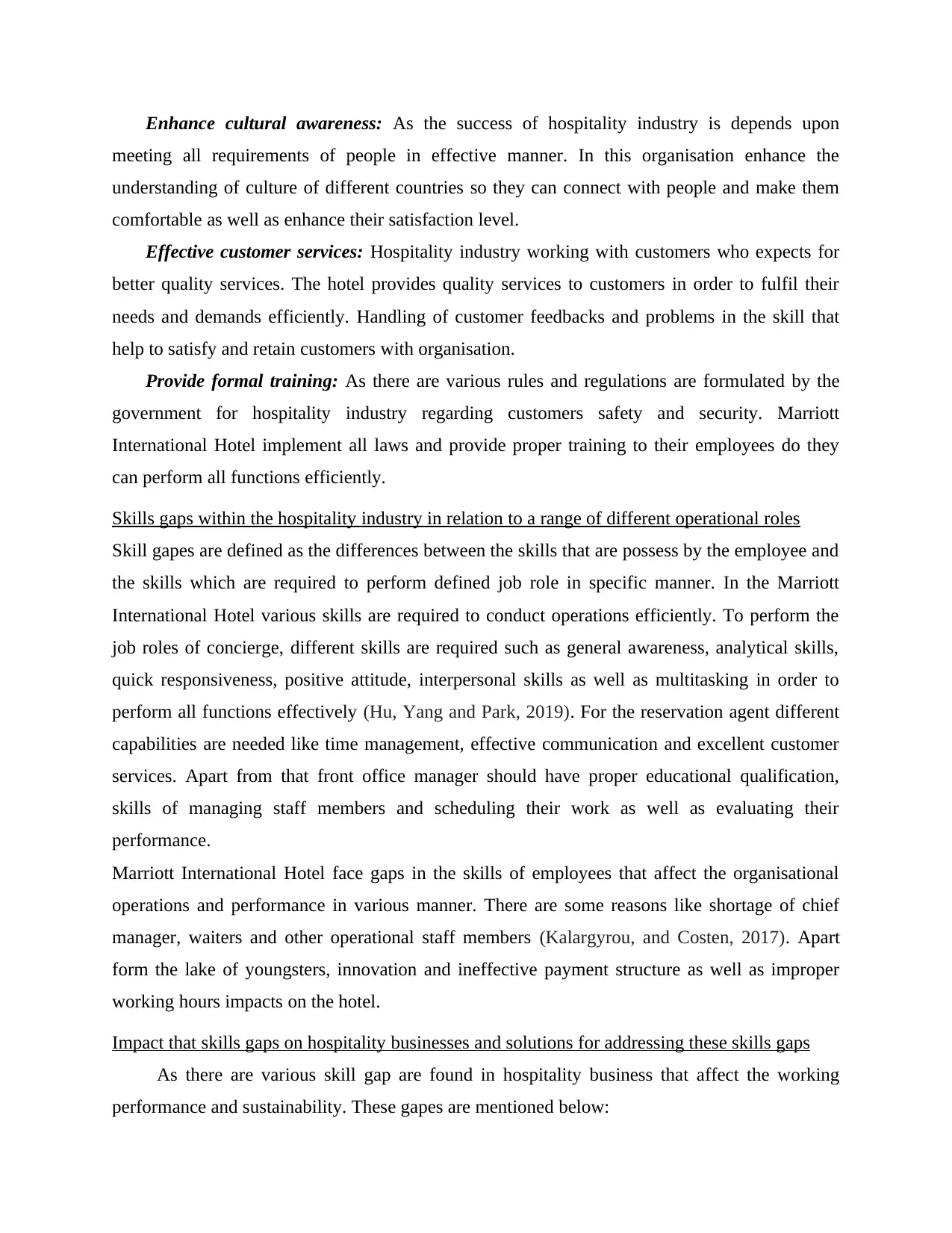
Enhance cultural awareness: As the success of hospitality industry is depends upon
meeting all requirements of people in effective manner. In this organisation enhance the
understanding of culture of different countries so they can connect with people and make them
comfortable as well as enhance their satisfaction level.
Effective customer services: Hospitality industry working with customers who expects for
better quality services. The hotel provides quality services to customers in order to fulfil their
needs and demands efficiently. Handling of customer feedbacks and problems in the skill that
help to satisfy and retain customers with organisation.
Provide formal training: As there are various rules and regulations are formulated by the
government for hospitality industry regarding customers safety and security. Marriott
International Hotel implement all laws and provide proper training to their employees do they
can perform all functions efficiently.
Skills gaps within the hospitality industry in relation to a range of different operational roles
Skill gapes are defined as the differences between the skills that are possess by the employee and
the skills which are required to perform defined job role in specific manner. In the Marriott
International Hotel various skills are required to conduct operations efficiently. To perform the
job roles of concierge, different skills are required such as general awareness, analytical skills,
quick responsiveness, positive attitude, interpersonal skills as well as multitasking in order to
perform all functions effectively (Hu, Yang and Park, 2019). For the reservation agent different
capabilities are needed like time management, effective communication and excellent customer
services. Apart from that front office manager should have proper educational qualification,
skills of managing staff members and scheduling their work as well as evaluating their
performance.
Marriott International Hotel face gaps in the skills of employees that affect the organisational
operations and performance in various manner. There are some reasons like shortage of chief
manager, waiters and other operational staff members (Kalargyrou, and Costen, 2017). Apart
form the lake of youngsters, innovation and ineffective payment structure as well as improper
working hours impacts on the hotel.
Impact that skills gaps on hospitality businesses and solutions for addressing these skills gaps
As there are various skill gap are found in hospitality business that affect the working
performance and sustainability. These gapes are mentioned below:
meeting all requirements of people in effective manner. In this organisation enhance the
understanding of culture of different countries so they can connect with people and make them
comfortable as well as enhance their satisfaction level.
Effective customer services: Hospitality industry working with customers who expects for
better quality services. The hotel provides quality services to customers in order to fulfil their
needs and demands efficiently. Handling of customer feedbacks and problems in the skill that
help to satisfy and retain customers with organisation.
Provide formal training: As there are various rules and regulations are formulated by the
government for hospitality industry regarding customers safety and security. Marriott
International Hotel implement all laws and provide proper training to their employees do they
can perform all functions efficiently.
Skills gaps within the hospitality industry in relation to a range of different operational roles
Skill gapes are defined as the differences between the skills that are possess by the employee and
the skills which are required to perform defined job role in specific manner. In the Marriott
International Hotel various skills are required to conduct operations efficiently. To perform the
job roles of concierge, different skills are required such as general awareness, analytical skills,
quick responsiveness, positive attitude, interpersonal skills as well as multitasking in order to
perform all functions effectively (Hu, Yang and Park, 2019). For the reservation agent different
capabilities are needed like time management, effective communication and excellent customer
services. Apart from that front office manager should have proper educational qualification,
skills of managing staff members and scheduling their work as well as evaluating their
performance.
Marriott International Hotel face gaps in the skills of employees that affect the organisational
operations and performance in various manner. There are some reasons like shortage of chief
manager, waiters and other operational staff members (Kalargyrou, and Costen, 2017). Apart
form the lake of youngsters, innovation and ineffective payment structure as well as improper
working hours impacts on the hotel.
Impact that skills gaps on hospitality businesses and solutions for addressing these skills gaps
As there are various skill gap are found in hospitality business that affect the working
performance and sustainability. These gapes are mentioned below:
⊘ This is a preview!⊘
Do you want full access?
Subscribe today to unlock all pages.

Trusted by 1+ million students worldwide
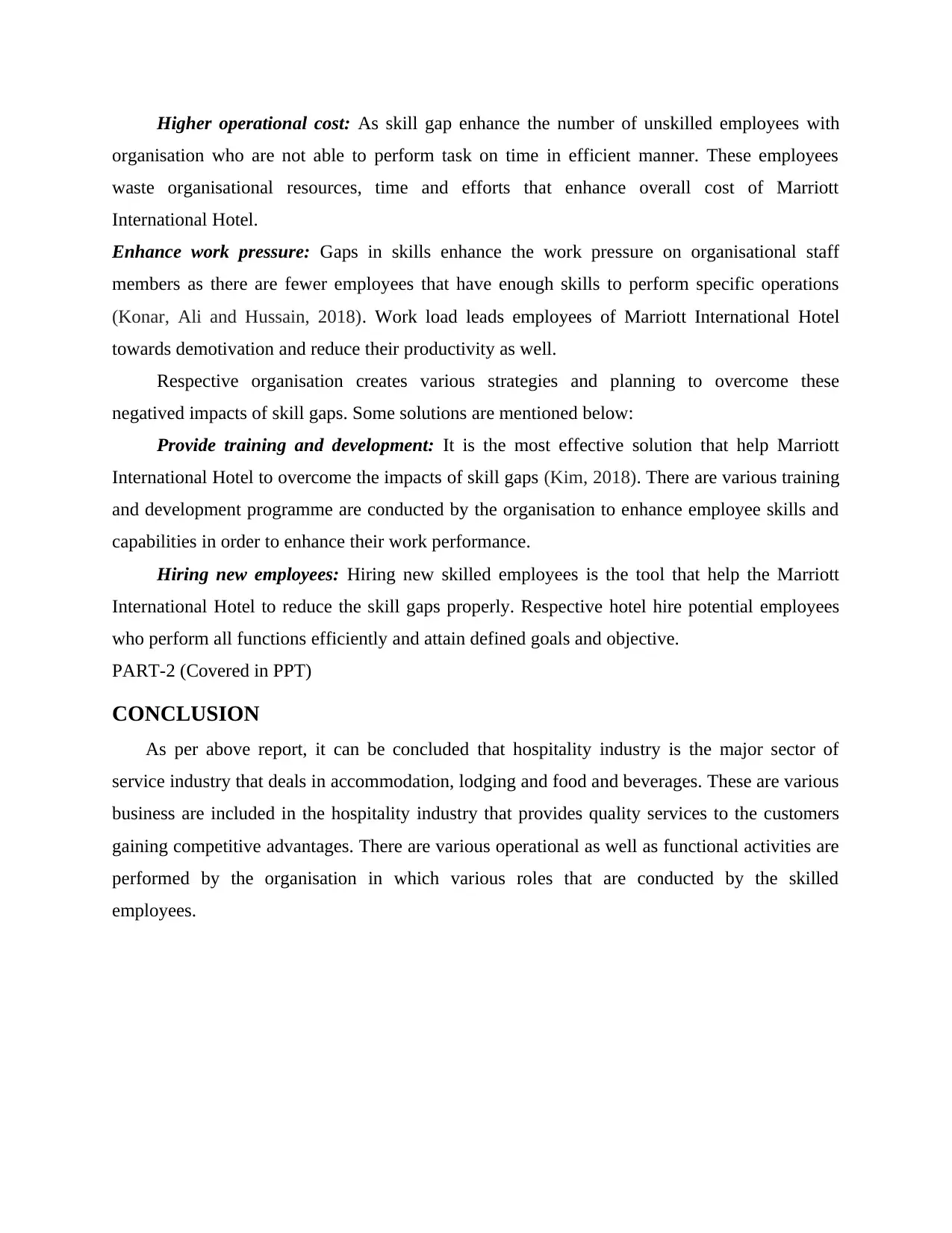
Higher operational cost: As skill gap enhance the number of unskilled employees with
organisation who are not able to perform task on time in efficient manner. These employees
waste organisational resources, time and efforts that enhance overall cost of Marriott
International Hotel.
Enhance work pressure: Gaps in skills enhance the work pressure on organisational staff
members as there are fewer employees that have enough skills to perform specific operations
(Konar, Ali and Hussain, 2018). Work load leads employees of Marriott International Hotel
towards demotivation and reduce their productivity as well.
Respective organisation creates various strategies and planning to overcome these
negatived impacts of skill gaps. Some solutions are mentioned below:
Provide training and development: It is the most effective solution that help Marriott
International Hotel to overcome the impacts of skill gaps (Kim, 2018). There are various training
and development programme are conducted by the organisation to enhance employee skills and
capabilities in order to enhance their work performance.
Hiring new employees: Hiring new skilled employees is the tool that help the Marriott
International Hotel to reduce the skill gaps properly. Respective hotel hire potential employees
who perform all functions efficiently and attain defined goals and objective.
PART-2 (Covered in PPT)
CONCLUSION
As per above report, it can be concluded that hospitality industry is the major sector of
service industry that deals in accommodation, lodging and food and beverages. These are various
business are included in the hospitality industry that provides quality services to the customers
gaining competitive advantages. There are various operational as well as functional activities are
performed by the organisation in which various roles that are conducted by the skilled
employees.
organisation who are not able to perform task on time in efficient manner. These employees
waste organisational resources, time and efforts that enhance overall cost of Marriott
International Hotel.
Enhance work pressure: Gaps in skills enhance the work pressure on organisational staff
members as there are fewer employees that have enough skills to perform specific operations
(Konar, Ali and Hussain, 2018). Work load leads employees of Marriott International Hotel
towards demotivation and reduce their productivity as well.
Respective organisation creates various strategies and planning to overcome these
negatived impacts of skill gaps. Some solutions are mentioned below:
Provide training and development: It is the most effective solution that help Marriott
International Hotel to overcome the impacts of skill gaps (Kim, 2018). There are various training
and development programme are conducted by the organisation to enhance employee skills and
capabilities in order to enhance their work performance.
Hiring new employees: Hiring new skilled employees is the tool that help the Marriott
International Hotel to reduce the skill gaps properly. Respective hotel hire potential employees
who perform all functions efficiently and attain defined goals and objective.
PART-2 (Covered in PPT)
CONCLUSION
As per above report, it can be concluded that hospitality industry is the major sector of
service industry that deals in accommodation, lodging and food and beverages. These are various
business are included in the hospitality industry that provides quality services to the customers
gaining competitive advantages. There are various operational as well as functional activities are
performed by the organisation in which various roles that are conducted by the skilled
employees.
Paraphrase This Document
Need a fresh take? Get an instant paraphrase of this document with our AI Paraphraser
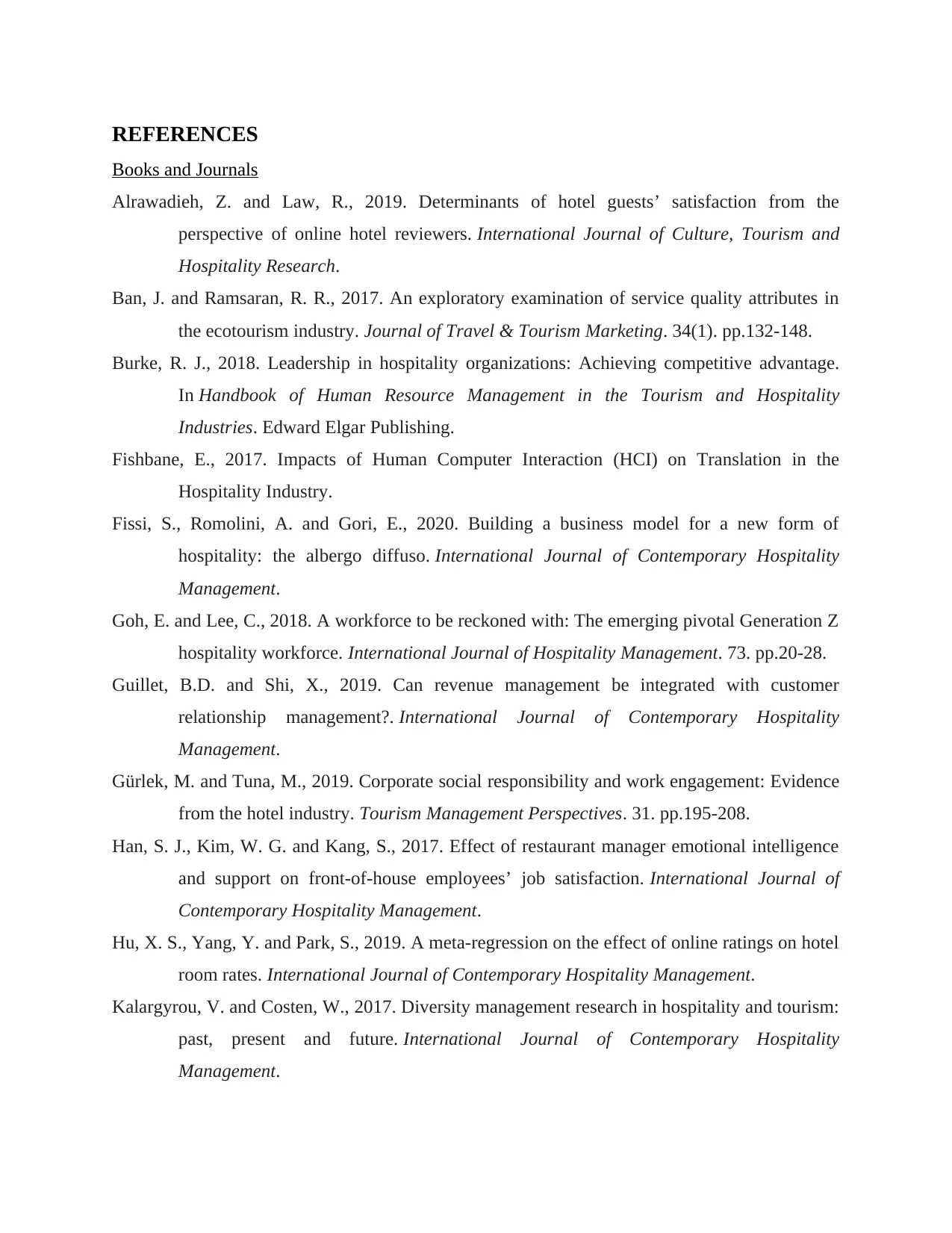
REFERENCES
Books and Journals
Alrawadieh, Z. and Law, R., 2019. Determinants of hotel guests’ satisfaction from the
perspective of online hotel reviewers. International Journal of Culture, Tourism and
Hospitality Research.
Ban, J. and Ramsaran, R. R., 2017. An exploratory examination of service quality attributes in
the ecotourism industry. Journal of Travel & Tourism Marketing. 34(1). pp.132-148.
Burke, R. J., 2018. Leadership in hospitality organizations: Achieving competitive advantage.
In Handbook of Human Resource Management in the Tourism and Hospitality
Industries. Edward Elgar Publishing.
Fishbane, E., 2017. Impacts of Human Computer Interaction (HCI) on Translation in the
Hospitality Industry.
Fissi, S., Romolini, A. and Gori, E., 2020. Building a business model for a new form of
hospitality: the albergo diffuso. International Journal of Contemporary Hospitality
Management.
Goh, E. and Lee, C., 2018. A workforce to be reckoned with: The emerging pivotal Generation Z
hospitality workforce. International Journal of Hospitality Management. 73. pp.20-28.
Guillet, B.D. and Shi, X., 2019. Can revenue management be integrated with customer
relationship management?. International Journal of Contemporary Hospitality
Management.
Gürlek, M. and Tuna, M., 2019. Corporate social responsibility and work engagement: Evidence
from the hotel industry. Tourism Management Perspectives. 31. pp.195-208.
Han, S. J., Kim, W. G. and Kang, S., 2017. Effect of restaurant manager emotional intelligence
and support on front-of-house employees’ job satisfaction. International Journal of
Contemporary Hospitality Management.
Hu, X. S., Yang, Y. and Park, S., 2019. A meta-regression on the effect of online ratings on hotel
room rates. International Journal of Contemporary Hospitality Management.
Kalargyrou, V. and Costen, W., 2017. Diversity management research in hospitality and tourism:
past, present and future. International Journal of Contemporary Hospitality
Management.
Books and Journals
Alrawadieh, Z. and Law, R., 2019. Determinants of hotel guests’ satisfaction from the
perspective of online hotel reviewers. International Journal of Culture, Tourism and
Hospitality Research.
Ban, J. and Ramsaran, R. R., 2017. An exploratory examination of service quality attributes in
the ecotourism industry. Journal of Travel & Tourism Marketing. 34(1). pp.132-148.
Burke, R. J., 2018. Leadership in hospitality organizations: Achieving competitive advantage.
In Handbook of Human Resource Management in the Tourism and Hospitality
Industries. Edward Elgar Publishing.
Fishbane, E., 2017. Impacts of Human Computer Interaction (HCI) on Translation in the
Hospitality Industry.
Fissi, S., Romolini, A. and Gori, E., 2020. Building a business model for a new form of
hospitality: the albergo diffuso. International Journal of Contemporary Hospitality
Management.
Goh, E. and Lee, C., 2018. A workforce to be reckoned with: The emerging pivotal Generation Z
hospitality workforce. International Journal of Hospitality Management. 73. pp.20-28.
Guillet, B.D. and Shi, X., 2019. Can revenue management be integrated with customer
relationship management?. International Journal of Contemporary Hospitality
Management.
Gürlek, M. and Tuna, M., 2019. Corporate social responsibility and work engagement: Evidence
from the hotel industry. Tourism Management Perspectives. 31. pp.195-208.
Han, S. J., Kim, W. G. and Kang, S., 2017. Effect of restaurant manager emotional intelligence
and support on front-of-house employees’ job satisfaction. International Journal of
Contemporary Hospitality Management.
Hu, X. S., Yang, Y. and Park, S., 2019. A meta-regression on the effect of online ratings on hotel
room rates. International Journal of Contemporary Hospitality Management.
Kalargyrou, V. and Costen, W., 2017. Diversity management research in hospitality and tourism:
past, present and future. International Journal of Contemporary Hospitality
Management.
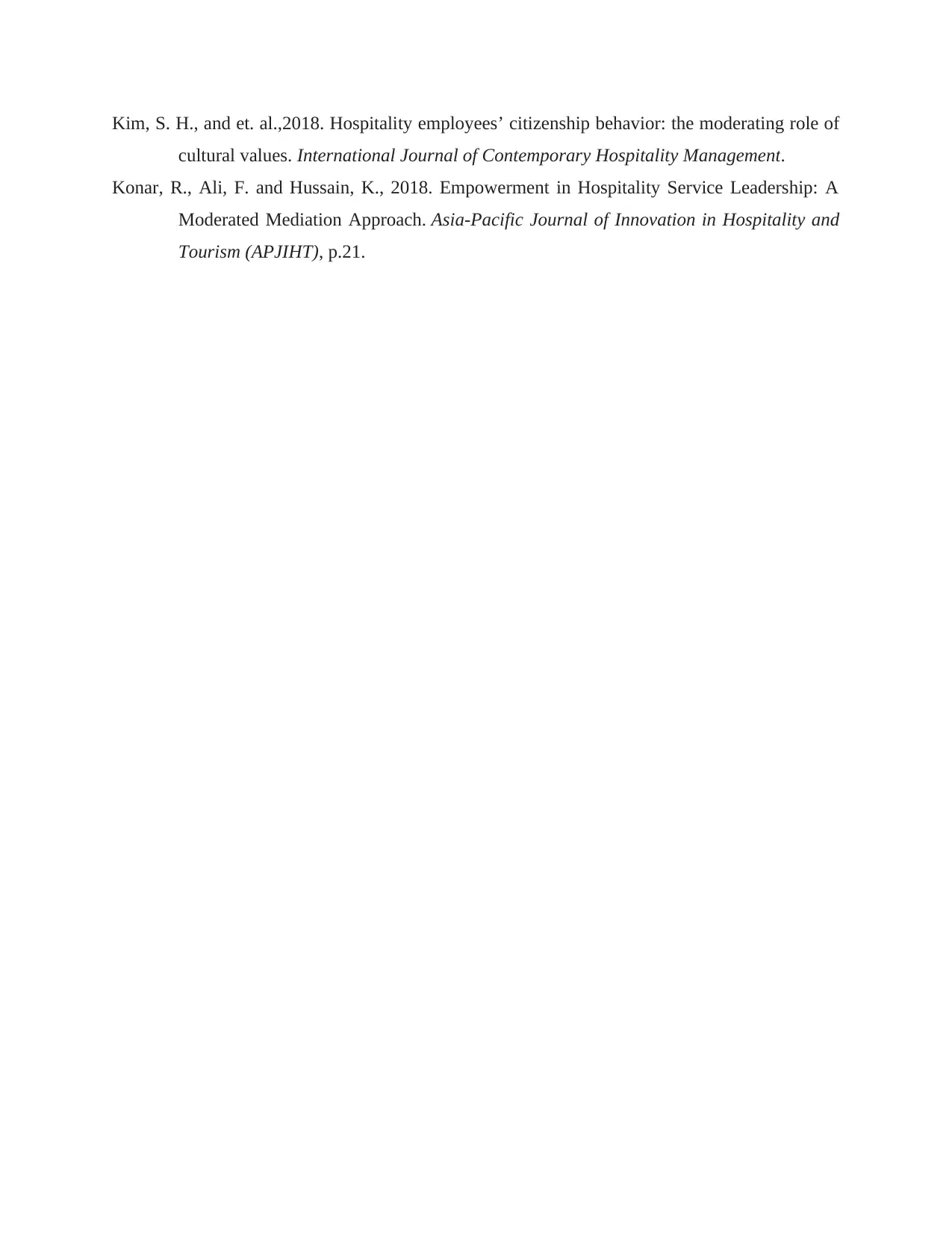
Kim, S. H., and et. al.,2018. Hospitality employees’ citizenship behavior: the moderating role of
cultural values. International Journal of Contemporary Hospitality Management.
Konar, R., Ali, F. and Hussain, K., 2018. Empowerment in Hospitality Service Leadership: A
Moderated Mediation Approach. Asia-Pacific Journal of Innovation in Hospitality and
Tourism (APJIHT), p.21.
cultural values. International Journal of Contemporary Hospitality Management.
Konar, R., Ali, F. and Hussain, K., 2018. Empowerment in Hospitality Service Leadership: A
Moderated Mediation Approach. Asia-Pacific Journal of Innovation in Hospitality and
Tourism (APJIHT), p.21.
⊘ This is a preview!⊘
Do you want full access?
Subscribe today to unlock all pages.

Trusted by 1+ million students worldwide
1 out of 13
Related Documents
Your All-in-One AI-Powered Toolkit for Academic Success.
+13062052269
info@desklib.com
Available 24*7 on WhatsApp / Email
![[object Object]](/_next/static/media/star-bottom.7253800d.svg)
Unlock your academic potential
Copyright © 2020–2026 A2Z Services. All Rights Reserved. Developed and managed by ZUCOL.




